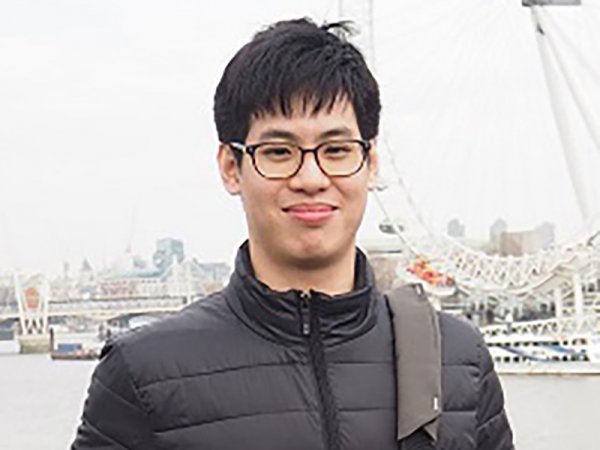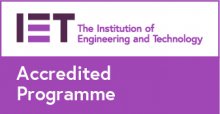

Key information
|
Full-time: 1 year |
|
Part-time: 5 years |
Download a prospectus
Book onto an open event
Sign up for a webinar
Why choose this course
Satellites give us an unprecedented perspective of our planet, enhance travel and provide global communications.
At Surrey, we’re internationally renowned for our work in satellite communications, broadcasting, terrestrial mobile networks and the internet: essential components of modern communication and information.
Our MSc in Satellite Communications Engineering is taught by academics and researchers with extensive theoretical expertise and practical experience – so you’ll get a learning experience that really is out of this world.
Five reasons to study for a masters in electrical and electronic engineering at Surrey
What you will study
Satellite communications enable wireless communication in regions where mobile networking may not be possible. Our course will give you an in-depth understanding of the engineering aspects of these important technologies.
With useful links to major satellite manufacturers, operators and service providers, Surrey is the proud home of the world’s largest academic research group specialising in 5G communications.
Our 5G Innovation Centre was founded by major national and international players in the communications industry, including the UK’s leading mobile operators. Here, the focus is on the research and development of mobile communications and wireless technology capable of meeting the needs of the digital economy and the world of tomorrow, and also how satellites will integrate with future 5G technology.

Student
Thanat Varathon
“One of the best things about the course, in my opinion, was the opportunity to experience seminars delivered by guest speakers from satellite companies.”
Find out more
Facilities, equipment and support
Through consistent investment, we have built up an impressive infrastructure to support you. The University of Surrey hosts Surrey Space Centre – a unique facility made up of academics and engineers from our own spin-out company, Surrey Satellite Technology Ltd.
Our mission control centre was designed and developed by students to support international CubeSat operations as part of the GENSO network, and it also supports the development of the University’s own educational satellites.
Our teaching laboratories provide hands-on experience of satellite design and construction through the use of EyasSAT nano-satellite kits. They also house meteorological satellite receiving stations for the live reception of satellite weather images.
Elsewhere, our fully-equipped RF lab has a network analyser and signal and satellite link simulators. The Rohde and Schwartz Satellite Networking Laboratory includes DVBS2-RCS generation and measurement equipment, and roof-mounted antennas for communicating live with satellites.
A security testbed also exists for satellite security evaluation. We have a full range of software support for assignments and project work, including MATLAB, and you will be able to access system simulators already built in-house.
Satellite communications engineering students at Surrey can also make use of SatNEX, a European Network of Excellence in satellite communications supported by ESA; a satellite platform exists to link the 22 partners around Europe. This is used for virtual meetings and to allow students to participate in lectures and seminars presented by partners.
Our own spin-out company, Surrey Satellite Technology Ltd, is situated close by on the Surrey Research Park and provides ready access to satellite production and industrial facilities. We also have strategic relationships with EADS Airbus Europe-wide and several other major communications companies.
Technical characteristics of the pathway
Our masters in satellite communications engineering will provide you with detailed and in-depth knowledge of the theory and practices applicable to communications techniques and spacecraft design. The course includes a range of modules in communications techniques and networking, as well as satellite engineering and spacecraft design and operations.
Additional optional modules enable you to apply the use of RF and microwave in subsystem design for either mobile communications, satellite communications, nanotechnology or for integration with optical communications.
The teaching material and projects on this course are closely related to the research being carried out in the University’s Institute for Communications Systems, 5G Innovation Centre and the Surrey Space Centre.
Research
Our current research concerns high throughput satellite design with advanced payload techniques. We are also working on mega constellations of satellites and on satellites within 5G. On the networking side, our work focuses on advanced internet over satellite and satellite security systems. You will complete your project alongside our research teams in these areas and learn from tailored modules on these advanced techniques.
Study and work abroad
There may be opportunities to acquire valuable European experience by working or conducting research abroad during your degree or shortly afterwards. It is possible to do this in the summer period with an Erasmus+ grant working on your dissertation or as a recent graduate. In order to qualify your Erasmus+ traineeship must be a minimum of two months.
Professional recognition
MSc – Institution of Engineering and Technology (IET).
Accredited by the Institution of Engineering and Technology on behalf of the Engineering Council as meeting the requirements for Further Learning for registration as a Chartered Engineer. Candidates must hold a CEng accredited BEng/BSc (Hons) undergraduate first degree to comply with full CEng registration requirements.
Careers and graduate prospects
We offer careers information, advice and guidance to all students whilst studying with us, which is extended to our alumni for three years after leaving the University.
Graduates of this course can be found in most of the world’s main satellite companies and form an active Surrey alumni group. Companies that have employed our graduates include
- Inmarsat
- SES
- Eutelsat
- Airbus.

Programme leader
Prof
Barry
Evans
Accreditations


Accreditation

Student support
Personal tutor
All taught students are assigned a personal tutor to support you while you study.
Read more
Student life
Our campus
At Surrey we offer the best of both worlds – a friendly campus university, set in beautiful countryside with the convenience and social life of Guildford on your doorstep.
Read more
Academic year structure
If you’re studying this course full-time, you will study eight modules across the year – four in each semester. During the first semester, you will also apply for and agree on a project with an academic supervisor and begin initial work on the project before working on it full-time after the end of Semester 2. From that point, you will have approximately two and a half months to complete the work and write up your dissertation.
You can also study this course part-time, taking between two and five years. The length depends on how many modules you study each year. You can study between two and six modules each year. We recommend part-time students work on their project in their final year of study when all eight modules have either been completed or are near completion.
Modules
Modules listed are indicative, reflecting the information available at the time of publication. Please note that modules may be subject to teaching availability, student demand and/or class size caps.
The University operates a credit framework for all taught programmes based on a 15-credit tariff. Modules can be either 15, 30, 45 or 60 credits, and additionally for some masters dissertations, 90 credits.
The structure of our programmes follows clear educational aims that are tailored to each programme. These are all outlined in the programme specifications which include further details such as the learning outcomes:
Optional modules for Year 1 (full-time) – FHEQ Levels 6 and 7
FOUR in total
A full-time student must choose:
TWO in Semester 1
TWO in Semester 2
A part-time student must complete study of four optional modules within 60 months.
Timetable
Course timetables are normally available one month before the start of the semester. Please note that while we make every effort to ensure that timetables are as student-friendly as possible, scheduled teaching can take place on any day of the week (Monday–Friday). Wednesday afternoons are normally reserved for sports and cultural activities. Part-time classes are normally scheduled on one or two days per week, details of which can be obtained from the course administrators. View our Timetabling Policy (PDF).
Entry requirements
A minimum of a 2:2 UK honours degree in either Communication Engineering, Computer Engineering, Electrical Engineering, Electrical and Computer Engineering, Electronic Engineering, Information and Communication Technologies, Physics or Telecommunication Engineering, or a recognised equivalent international qualification. We’ll also consider relevant work experience if you don’t meet these requirements.
English language requirements
IELTS Academic: 6.5 overall with 6.0 in Writing and 5.5 in each other element.
View the other English language qualifications that we accept.
If you do not currently meet the level required for your programme, we offer intensive pre-sessional English language courses, designed to take you to the level of English ability and skill required for your studies here.
Credit transfer
The University of Surrey recognises that many students enter their higher education course with valuable knowledge and skills developed through a range of professional, vocational and community contexts. If this applies to you, a process called recognition of prior learning (RPL) may allow you to enter your course at a point appropriate to your previous learning and experience, or to join the start of a course without the formal entry requirements. This means that you may be exempt from certain elements of study in the course for which you have applied and be awarded credit based on your previous qualifications/experience. There are restrictions on RPL for some courses and fees may be payable for certain claims.
Please see the code of practice for recognition of prior learning and prior credit: taught programmes (PDF) for further information. Please email Admissions with any queries.
International Pre-masters
This one or two-semester pathway programme for international students leads to a wide range of postgraduate degrees.
Read more
Fees
Start date: October 2020
|
Full-time – 1 year UK/EU £10,300 Overseas £21,700 |
Part-time – 5 years UK/EU £1,100* Overseas £2,400* |
* per 15 credits
Please note:
- These fees apply to students commencing study in the academic year 2020-21 only. Fees for new starters are reviewed annually.
- If you are on an unstructured self-paced part-time course, the fee shown is per 15 credits for the 2020-21 academic year. The fee payable in subsequent years will be reviewed annually.
View the list of fees for all postgraduate taught courses.
Funding
You may be able to borrow money to help pay your tuition fees and support you with your living costs. Find out more about student finance.
Scholarships and bursaries
We’re committed to making sure that we offer support for students who might need it.
Asylum Seeker Bursary
Application Deadline: 30.06.20
The University of Surrey is pleased to be offering financial support to those seeking sanctuary in the UK. This award has been developed to …
Find out more
Surrey International Masters Scholarship
Application Deadline: 30.09.20
A new scholarship scheme aimed at welcoming new masters students to Surrey from seven different countries.
Find out more
Admission information
Our postgraduate admissions policy provides the basis for admissions practice across the University and gives a framework for how we encourage, consider applications and admit students. You can also read our postgraduate applicant guidance.
Terms and conditions
When you accept an offer of a place at the University of Surrey, you are agreeing to comply with our policies and regulations, and our terms and conditions. These terms and conditions are provided in two stages: first when we make an offer and second when students who have accepted their offers register to study at the University. View our offer terms and conditions and our generic registration terms and conditions (PDF) as a guide as to what to expect.
Please note: our offer terms and conditions will be available in the September of the calendar year prior to the year in which you begin your studies. Our registration terms and conditions will vary to take into account specifics of your course.
Disclaimer
This online prospectus has been prepared and published in advance of the academic year to which it applies. The University of Surrey has used its reasonable efforts to ensure that the information is accurate at the time of publishing, but changes (for example to course content or additional costs) may occur given the interval between publishing and commencement of the course. It is therefore very important to check this website for any updates before you apply for a course with us. .
Campus location
Stag Hill
Stag Hill is the University’s main campus and where the majority of our courses are taught.
University of SurreyAddress
University of Surrey
Guildford
Surrey GU2 7XH

